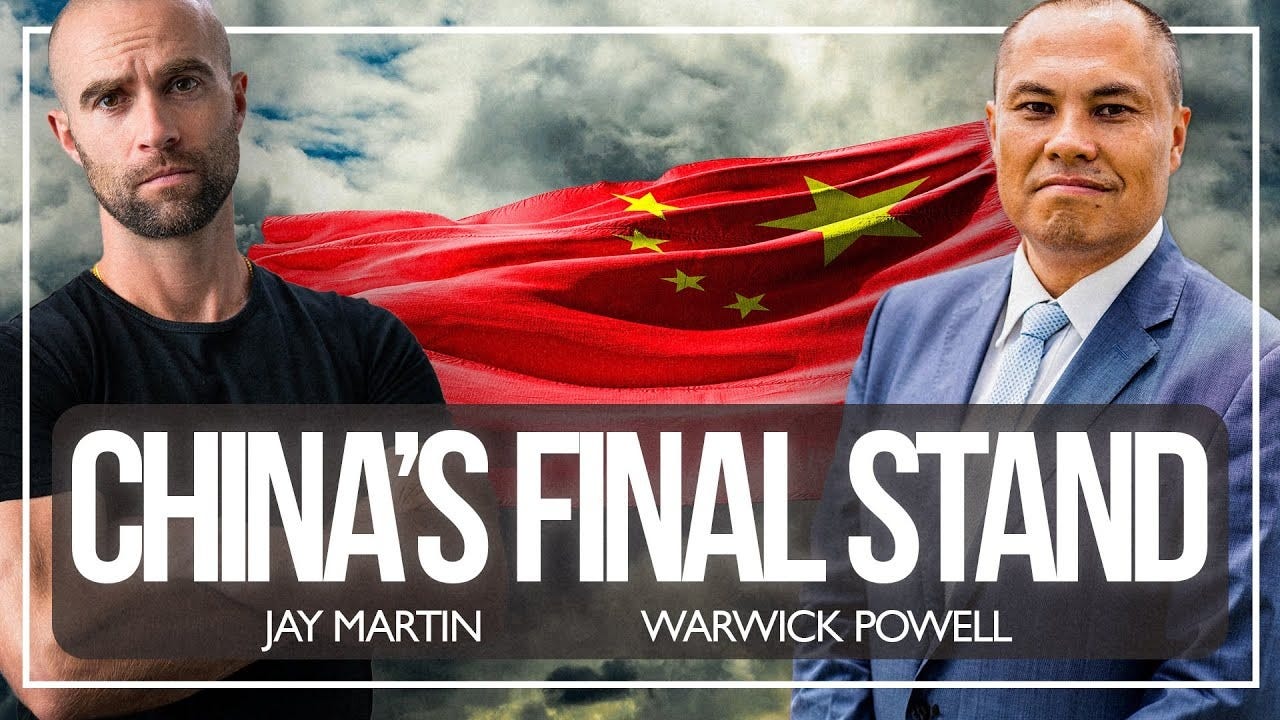Who is really in charge?
The Sunday Essay ☕️
Interesting things I’ve read this week
“I am wearing your clothes, I speak your language, I watch your films, and today is whatever date it is because you say so.”
A Malaysian lawyer’s response to British journalist Martin Jacques, speaking on European dominance.
When Captain Elliot and the British navy arrived in Guangzhou at the onset of the Opium Wars in 1839, his iron-hulled ships, long-range cannons, and Congreve rockets made quick work of the Chinese fleet of sailboats and soldiers wielding outdated muskets, bows, and swords.
The imbalance in technological advancement left both the British and the Chinese in absolute shock of the other.
The Chinese had never seen an iron ship or ocean-born rockets.
The British had not seen matchlock muskets, spears or crossbows on the battlefield in generations.
The Opium Wars of the 19th century marked a significant turning point in global history, signalling the rise of European imperialism and the beginning of a more direct and sustained Western involvement in Asia.
Most historians view this era (and this battle specifically) as the pivotal moment that affirmed European superiority.
Why do I find this relevant?
Both navies were shocked by the outcome of the first Opium War because, until this point, there had been no such thing as European superiority.
One of the most influential figures of the 18th century was a French Enlightenment writer, philosopher and historian named Voltaire.
In his Dictionnaire Philosophique, 1764, (written only 80 years before the first shots of the Opium Wars were fired), he wrote,
“Their (the Chinese) morality is the most excellent, their laws the wisest in the world; they have an Academy of Sciences, which flourished when we were covered with rags and ignorance...”
Today, when we think of the world's most famous explorers, Italian names like Christopher Columbus and Marco Polo come to mind, along with the Spanish explorer Hernán Cortés, the Portuguese navigator Ferdinand Magellan, and the British Captain James Cook.
In short, we think of Europeans.
Columbus set sail for his voyage to America in 1492, leading three ships with a crew of 90 men.
Yet nearly 100 years before Columbus crossed the 3,000-mile stretch of the North Atlantic, reaching the Americas, in 1405, a far lesser-known explorer named Zheng He embarked on a 10,000-mile journey across the Indian Ocean from China, reaching East Africa.
While Columbus commanded three ships and 90 men, Zheng He led a fleet of 300 ships with a crew of 27,000, including 180 doctors and pharmacists. Zheng He was armed with dozens of maritime charts and magnetic compasses; Columbus, on the other hand, had no idea where he was.
Columbus didn’t know that the continent he landed on, which was 3000 miles away, existed. In contrast, Zheng He was on a mission to negotiate trade agreements with foreign rulers and establish tributary relations 10,000 miles away.
To say that Western technology was inferior is a colossal understatement—it was mere remnants of a bygone era compared to Chinese advancements.
So what happened between Chinese explorer Zheng He and British Captain Elliot that led to this stark reversal in supremacy? This is a fascinating point of contention among economists and historians, mainly because it begs a question that precedes the question of “Will the West continue to rule the world?” with a new question:
Does the West rule the world?
Or, in the bigger span of history, has the West stumbled into a 200-year hiccup amidst an otherwise 4000-year history of Eastern dominance?
Fun, to debate.
This week on the podcast, I was joined by Professor Warwick Powell, a Senior Fellow at the Taihe Institute in Beijing and an Adjunct Professor at the Queensland University of Technology.
This was one of the most enlightening conversations I have had on the podcast this year. We went deep into the South Pacific tensions, the fate of Taiwan, and the USA/China competitive landscape.
Let me know what you think in the comments.
That’s all for today. Go do some push-ups.
Jay




Our Founding Fathers had it right. Stay out of foreign wars and entangling alliances. Instead, starting with the Spanish-American War, we launched late into colonialism. We are now neck-deep in entangling alliances and are effectively at war somewhere most of the time, undeclared, of course. We threw away our manufacturing birthright and so now we produce very little besides agricultural products, bombs, and, if we are lucky, a few civil aircraft which actually fly. The American Middle Class was destroyed when services turned out not to be an equally well-paying substitute for producing manufactured products. Empires typically exhaust themselves. Just look at what the UK was and is now. The U.S. should never be about who is "ruling the world" but rather, are we defending American soil and only American soil? Stop sending billions to other countries. Every country needs to sink or swim on their own. Our Founding Fathers cared only about the American people. It is a concept totally lost today on those inside the Beltway. One day after Election Day, we are totally forgotten. There is a way to "rule the world," not through domination, but by such a good example, other countries would want to emulate it. We can only hope and pray.
Can‘t wait to listen to this conversation Jay. I had no idea about the Chinese explorer Zheng He or his massive commercial fleet. Truly fascinating.